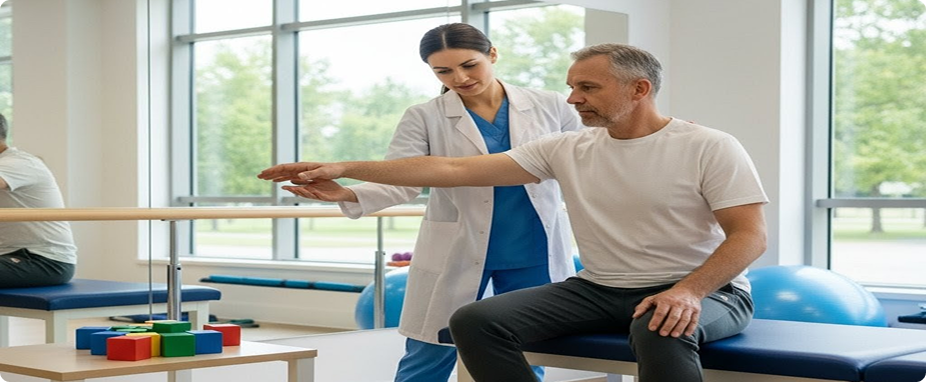
Physiotherapy for stroke helps restore movement, strength, balance, and coordination. Techniques include NDT/Bobath, task-oriented training, PNF, CIMT, robotic-assisted therapy, and gait training. Early intervention promotes neuroplasticity, independence, and improved quality of life.
Rehabilitation after spinal cord injury focuses on mobility, strength, posture, balance, and endurance. Programs include gait training, suspension therapy, functional strengthening, biofeedback, and wheelchair mobility training to maximize independence.
Physiotherapy for Parkinson’s disease emphasizes gait re-education, balance training, rhythmic cueing, flexibility exercises, and postural correction. Regular therapy reduces stiffness, improves mobility, and maintains daily living independence.
For individuals with MS, physiotherapy targets fatigue management, strengthening, mobility training, flexibility, and balance. Tailored programs improve endurance, coordination, and overall functional independence.
Rehabilitation for TBI patients includes postural re-education, neurofacilitation, balance training, gait practice, and functional strengthening. Therapy enhances motor recovery and supports daily activity participation.
Physiotherapy in GBS includes graded strengthening, mobility training, breathing exercises, and endurance building. Therapy aids progressive recovery of muscle function and independence.
Patients with ataxia and coordination deficits benefit from balance exercises, gait re-education, proprioceptive training, and core strengthening to improve stability and reduce fall risk.
Physiotherapy addresses weakness, loss of balance, and mobility issues. Programs include strengthening, gait training, sensory stimulation, and functional exercises to restore safe movement.
Physiotherapy for dystonia includes stretching, posture correction, motor control retraining, relaxation techniques, and task-specific activities to improve functional movement.
Therapy aims to maintain mobility, reduce stiffness, improve respiratory function, and delay functional decline through low-intensity strengthening, breathing exercises, and functional training.
Physiotherapy supports recovery from peripheral nerve injuries with neuromuscular re-education, strengthening, sensory re-education, and functional retraining.
© 2025 PhysioMeet. All Rights Reserved